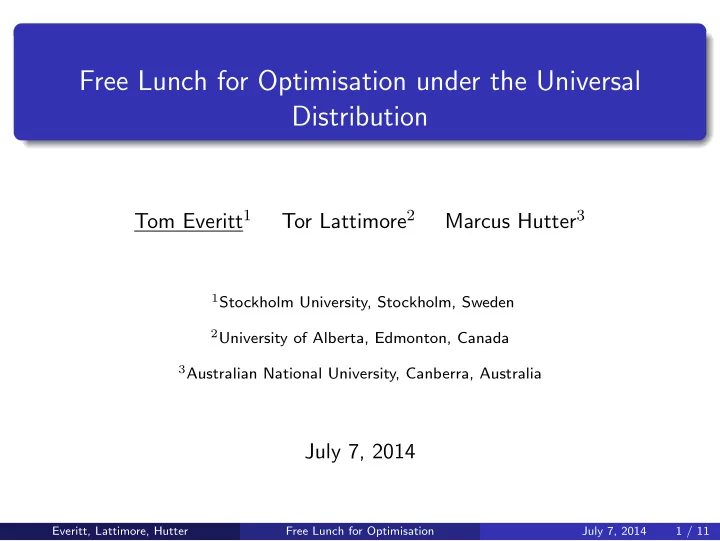

Free Lunch for Optimisation under the Universal Distribution Tom Everitt 1 Tor Lattimore 2 Marcus Hutter 3 1 Stockholm University, Stockholm, Sweden 2 University of Alberta, Edmonton, Canada 3 Australian National University, Canberra, Australia July 7, 2014 Everitt, Lattimore, Hutter Free Lunch for Optimisation July 7, 2014 1 / 11
Outline Are universal optimisation algorithms possible? Background: Finite Black-box Optimisation (FBBO) and the NFL theorems The Universal Distribution Our results Conclusions and Outlook Everitt, Lattimore, Hutter Free Lunch for Optimisation July 7, 2014 2 / 11
Finite Black-box Optimisation FBBO is a formal setting for Simulated Annealing, Genetic Algorithms, etc. It is characterized by: Finite search space X , finite range Y , unknown f : X → Y . An optimisation algorithm repeatedly chooses points x i ∈ X to evaluate. Goal: Minimimize probes-till-max (Optimisation Time). Distribution P over the finite set { f : X → Y } = Y X . P -expected Optimisation Time: Perf P ( a ) = E P [ probes-till-max ( a )] P affects bounds on optimisation performance. Everitt, Lattimore, Hutter Free Lunch for Optimisation July 7, 2014 3 / 11
The NFL (No Free Lunch) theorems Definition There is NFL for P if Perf P ( a ) = Perf P ( b ) . Theorem (Original NFL (Wolpert&Macready, 1997)) P uniform = ⇒ NFL for P . = ⇒ so no universal optimisation? Uniform = unbiased? Uniform means random noise. 10 5 0 0 5 10 Our suggestion to avoid NFL: The Universal Distribution (not new). Everitt, Lattimore, Hutter Free Lunch for Optimisation July 7, 2014 4 / 11
The Universal Distribution – Background Kolmogorov complexity: K ( x ) := min p { ℓ ( p ) : p prints x } m ( x ) := 2 − K ( x ) Universal distribution: 000000000 0101001101 Example: Low High K High Low m Agrees with Occam’s razor with “simplicity bias” Dominates all (semi-)computable (semi-)measures Essentially regrouping invariant Offers mathematical solution to the induction problem (Solomonoff induction). Successfully used in Reinforcement Learning (Hutter, 2005), and for general clustering algorithm (Cilibrasi&Vitanyi, 2003) Everitt, Lattimore, Hutter Free Lunch for Optimisation July 7, 2014 5 / 11
The Universal Distribution in FBBO May equivalently be defined in two ways: m XY ( f ) := 2 − K ( f | X,Y ) (1) ≈ “the probability that a ‘random’ program acts like f ” (2) (1) shows bias towards simplicity 6 4 Y 2 0 0 1 2 3 4 5 6 X Everitt, Lattimore, Hutter Free Lunch for Optimisation July 7, 2014 6 / 11
The Universal Distribution in FBBO May equivalently be defined in two ways: m XY ( f ) := 2 − K ( f | X,Y ) (1) ≈ “the probability that a ‘random’ program acts like f ” (2) (2) shows the wide applicability of the universal distribution. ? f X ? Y X Y Uniform distribution Universal distribution The uncertainty pertains to the system behind the mapping. Everitt, Lattimore, Hutter Free Lunch for Optimisation July 7, 2014 7 / 11
Results – Good News The universal distribution permits free lunch Theorem (Universal Free Lunch) There is free lunch under the universal distribution for all sufficiently large search spaces. Follows from simplicity bias: 4 4 2 2 0 0 0 1 2 3 4 5 0 1 2 3 4 5 Everitt, Lattimore, Hutter Free Lunch for Optimisation July 7, 2014 8 / 11
Results – Bad News Unfortunately, the universal distribution does not permit sublinear maximum finding Theorem (Asymptotic bounds) Expected optimisation time increases linearly with the size of the search space. Optimisation is a hard problem. Degenerate functions impede performance (NIAH-functions and “adversarial” functions). Needle-in-a-haystack function: 1 0 0 1 2 3 4 5 6 Everitt, Lattimore, Hutter Free Lunch for Optimisation July 7, 2014 9 / 11
Conclusions and Outlook The universal distribution is a philosophically justified prior for finite black-box optimisation. It offers free lunch, but not sublinear maximum finding. So meta-heuristics with different universal performance exist, but the difference is limited. Future research: Minimal condition enabling sublinear maximum finding. Everitt, Lattimore, Hutter Free Lunch for Optimisation July 7, 2014 10 / 11
References Rudi Cilibrasi and Paul M B Vitanyi. Clustering by compression. IEEE Transactions on Information Theory , 51(4):27, 2003. Marcus Hutter. Universal Artificial Intelligence: Sequential Decisions based on Algorithmic Probability . Lecture Notes in Artificial Intelligence (LNAI 2167). Springer, 2005. David H Wolpert and William G Macready. No free lunch theorems for optimization. IEEE Transactions on Evolutionary Computation , 1(1):270–283, 1997. Everitt, Lattimore, Hutter Free Lunch for Optimisation July 7, 2014 11 / 11
Recommend
More recommend